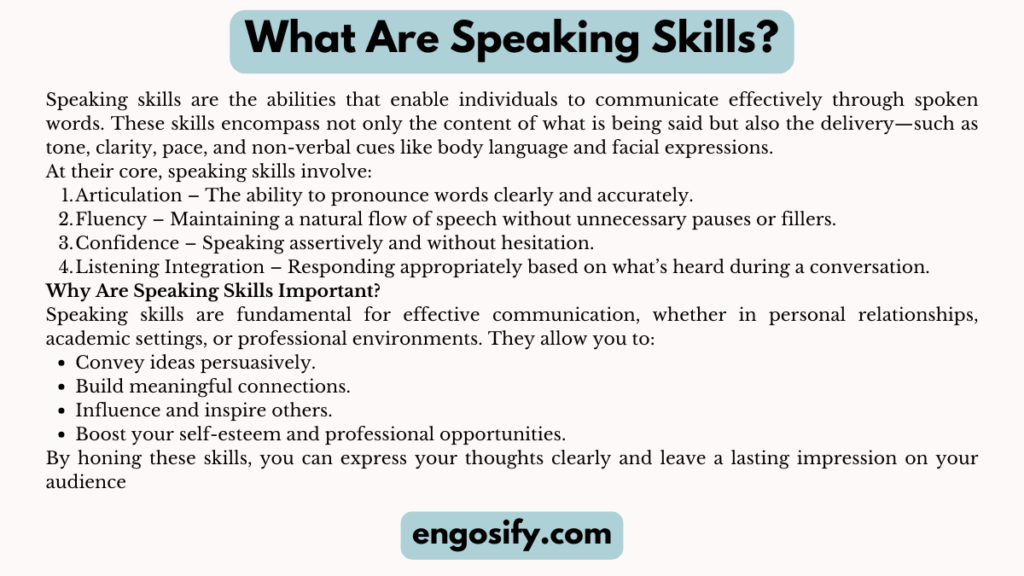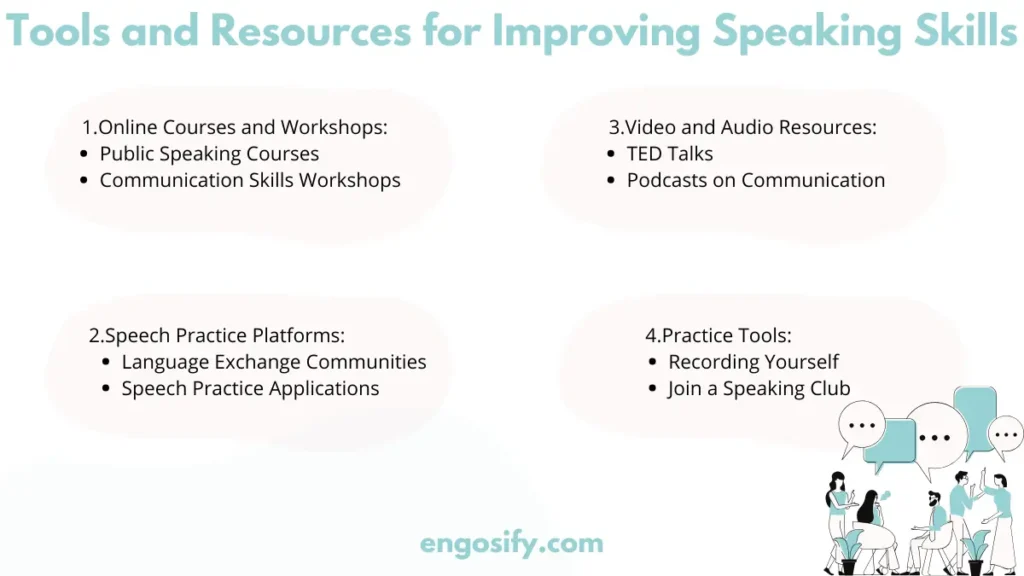Mastering speaking skills can feel like climbing a mountain, but with the right tools, strategies, and a touch of persistence, anyone can reach the summit. Whether you aim to ace a job interview, captivate an audience, or simply express yourself clearly, speaking effectively is the key to unlocking countless opportunities. This article is your guide to understanding, improving, and ultimately mastering the art of speaking with confidence and clarity.
Introduction
What Are Speaking Skills?
Speaking skills are the foundation of effective communication, enabling you to convey your ideas, feelings, and opinions clearly and persuasively. But they’re not just about words. Effective speaking blends verbal and non-verbal cues, ensuring your message resonates with the listener. These skills are vital not only in professional settings but also in personal interactions.
The Importance of Effective Speaking
Why should you bother mastering your speaking skills? Well, here’s the thing: words have power. They can inspire, persuade, and connect people in profound ways. Whether you’re pitching an idea at work, teaching a class, or simply engaging in small talk, strong speaking skills help you leave a lasting impression.
Plus, honing your ability to speak with confidence can significantly boost self-esteem, paving the way for greater success in various aspects of life. And guess what? You don’t need to be born with it—it’s a learnable skill!

Understanding the Fundamentals of Speaking Skills
Components of Effective Speaking
Becoming a great speaker isn’t magic—it’s a mix of essential elements that work together seamlessly. Here’s what you need to focus on:
- Clarity
Ever tried following a story told in mumbles? Not fun, right? Clear articulation ensures your audience catches every word, keeping them engaged and informed. - Confidence
Confidence is contagious. When you speak with assurance, your audience trusts you more and pays closer attention. - Engagement
A great speaker draws people in, creating a connection that’s both intellectual and emotional. Stories, humor, and eye contact are your secret weapons. - Non-verbal Communication
Actions speak louder than words, and your body language, facial expressions, and gestures are doing a lot of talking too. A smile here, a nod there—it all adds up.
Common Challenges in Speaking
Even seasoned speakers face hiccups. Let’s address some common roadblocks and how to navigate them:
- Fear of Public Speaking
Known as glossophobia, it’s the most prevalent speaking challenge. Your heart races, palms sweat, and words flee. Tackling this requires practice and desensitization. (Need tips? Check out these 10 tips for improving your public speaking skills.) - Language Barriers
For non-native speakers, conveying thoughts in another language can be daunting. Enhancing vocabulary and practicing conversations are the best remedies. - Lack of Practice
Let’s face it—no one gets it perfect the first time. Regular practice is your best friend in turning weaknesses into strengths.
Strategies to Master Your Speaking Skills
1. Practice Regularly
The golden rule of mastering any skill? Practice. It’s no different for speaking skills. Here’s how to make it work:
- Importance of Consistent Practice
Practice isn’t just repetition; it’s about improving each time. Speak in front of a mirror, record yourself, or join a speaking group. This builds muscle memory and boosts your confidence. - Techniques for Daily Practice
Read aloud daily, narrate your thoughts, or practice impromptu speeches. Even talking to yourself (yes, really!) can sharpen your skills over time.
2. Know Your Audience
Effective communication starts with understanding who you’re talking to.
- Researching Your Audience
Tailor your tone, vocabulary, and examples to match the audience’s interests and knowledge level. For instance, explaining tech jargon to kids would require a simpler approach than to industry professionals. - Tailoring Your Message Accordingly
Speak their language—literally and figuratively. Adjust your content to resonate with their needs, ensuring your message lands perfectly.
3. Organize Your Material Effectively
A well-organized speech is half the battle won.
- Structuring Your Speech
Follow the classic format: introduction, body, and conclusion. Start with a hook, expand on your main points, and finish strong. - Using Outlines and Notes
Jot down key points as a roadmap for your talk. Avoid reading word-for-word; instead, use notes to guide you naturally.
4. Develop Your Non-verbal Communication
What you say matters, but how you say it can make or break the delivery.
- Body Language
Keep an open posture, use hand gestures for emphasis, and avoid crossing arms, which can seem defensive. - Eye Contact
Look your audience in the eye—it creates connection and trust. But don’t stare; shift focus between individuals or sections of the crowd. - Gestures
Use natural, purposeful gestures to highlight points. They add energy and help illustrate your message.
5. Enhance Your Vocal Variety
A monotone delivery can put even the most enthusiastic audience to sleep.
- Pitch
Varying your pitch keeps your speech dynamic and engaging. - Pace
Slow down for emphasis, speed up to show excitement, but always stay clear. - Volume
Ensure you’re audible but not shouting. Adjust volume based on the setting and audience size.
6. Utilize Visual Aids Wisely
A picture is worth a thousand words, but only if used effectively.
- Types of Visual Aids
Slides, props, charts, or even videos can complement your speech. - Best Practices for Visual Aid Usage
Keep visuals simple and relevant. Don’t clutter slides with text—let them support, not replace, your words.
7. Manage Speaking Anxiety
Even the best speakers get nervous—it’s all about managing it.
- Understanding Speaking Anxiety
Nervousness often stems from fear of judgment or failure. Recognizing this is the first step to overcoming it. - Techniques to Overcome Anxiety
Deep breathing, visualization, and preparation work wonders. Consider practicing mindfulness to stay grounded before stepping up.
8. Seek Constructive Feedback
Feedback is a gift—use it wisely.
- Importance of Feedback
Honest critique highlights blind spots, helping you grow faster. - Incorporating Feedback into Practice
Don’t just hear feedback—act on it. Adjust, improve, and revisit until you feel a marked difference.
Tools and Resources for Improving Speaking Skills
Online Courses and Workshops
The digital age has made learning more accessible than ever. Dive into these resources to refine your speaking skills:
- Public Speaking Courses
Platforms like Coursera, Udemy, and LinkedIn Learning offer affordable and comprehensive courses on public speaking and communication. Some even provide certificates that add value to your professional profile. - Communication Skills Workshops
Look for workshops in your local area or virtual seminars hosted by experts. These are interactive and often provide personalized feedback, accelerating your progress.
Practice Platforms
Practicing regularly is crucial, and technology can lend a helping hand.
- Language Exchange Communities
Websites like Tandem and HelloTalk connect you with native speakers around the globe, allowing you to practice in real-time. - Speech Practice Applications
Apps such as Orai or Speechify analyze your voice, pointing out areas for improvement like tone, pace, and clarity. It’s like having a speech coach in your pocket!
Books and Publications
Sometimes, the best insights come from flipping through the pages of a great book.
- Recommended Reading List
- “Talk Like TED” by Carmine Gallo: Learn secrets from the best TED speakers.
- “The Art of Public Speaking” by Dale Carnegie: A classic guide to effective communication.
- “Speak With No Fear” by Mike Acker: Tactics to overcome speaking anxiety.
Leveraging these tools and resources will fast-track your journey to mastering speaking skills. For more ideas on crafting speeches like a pro, check out 9 Tips to Mastering the Skill of Public Speaking.

FAQs
How Can I Improve My English-Speaking Skills Alone?
Improving your English-speaking skills solo is absolutely possible with dedication and the right approach. Start by practicing regularly—speak to yourself, record your voice, and listen for areas to enhance. Read aloud from books, newspapers, or scripts to improve pronunciation and fluency. Additionally, platforms like HelloTalk or Tandem connect you with conversation partners, providing a practical way to refine your skills.
For more tips on polishing your communication, explore How to Improve Your Communication Skills in English.
What Are the Best Ways to Overcome the Fear of Public Speaking?
Conquering glossophobia—the fear of public speaking—takes a mix of preparation and courage. Start by knowing your material inside and out. Practice in front of a mirror or a trusted friend, gradually increasing the size of your audience. Breathing exercises and visualization techniques can also help you stay calm.
Remember, every great speaker once started with shaky knees. As you expose yourself to more speaking opportunities, the fear will diminish.
How Important Is Body Language in Effective Speaking?
Body language plays a pivotal role in communication, often conveying more than your words. A confident stance, purposeful gestures, and steady eye contact can amplify your message, making it more memorable and impactful. On the flip side, closed-off body language or fidgeting can distract and dilute your delivery.
Mastering body language is an art, but once you integrate it with your verbal skills, you’ll notice a marked difference in how your audience perceives you.
Conclusion
Mastering your speaking skills isn’t just about delivering words—it’s about crafting connections. From understanding the fundamentals, like clarity and confidence, to embracing strategies such as consistent practice and engaging non-verbal communication, every step plays a vital role.
We explored the tools and resources available, from online courses and speech apps to insightful books, ensuring that no matter where you are on your journey, there’s support to help you progress. By addressing common fears like public speaking anxiety and implementing tailored solutions, you’re set to conquer challenges with poise.
Here’s the bottom line: Anyone can become a great speaker. With consistent effort, a willingness to learn, and the courage to face discomfort, you’ll soon find yourself speaking with ease and confidence. Don’t be afraid to make mistakes—they’re stepping stones to improvement.
Start small, stay curious, and remember, your voice has the power to inspire, persuade, and connect. Now, go out there and master your speaking skills!

